No CrossRef data available.
Published online by Cambridge University Press: 10 May 2010

page 363 note * According to the Visitation of London, 1633–4, (Harl. M.SS. 1476, ff. 101, 1726) Edmond Waring of Le Croft (Lea Croft) co. Stafford, was the eldest son of Thomas Waring of Ashmouth in the same county, by Elizabeth, daughter of Walter James of the Grange, also in Staffordshire. Thomas was the son of Michael Waring of the Lea, near Wolverhampton.
One of the testator's sons was Robert Waring of Christchurch, Oxford, who is noticed among learned writers of that University by Wood, Athen. Oxou. (ed. Bliss) iii. 456.
page 364 note * Seeld bed=cieled bed, i.e. with a canopy.
page 364 note † Sea=say: delicate serge or woollen cloth.
page 364 note ‡ Trusbed=travelling-bed, usually trussing-bed.
page 365 note * Landiron=iron dog for the fire, usually called andiron.
page 365 note † Three-legged stools. See Promptorium, s.v. Bofet.
page 365 note ‡ Tundish=funnel.
page 366 note * Skinker=a vessel or bowl. Cf. German “schenken,” to pour out.
page 366 note † Owle cup=cup formed like an owl, possibly a fancy connected with his house at Owlbury.
page 366 note ‡ Pursland=porcelaine.
page 366 note § Voyder=a vessel for collecting the fragments of a meal.
page 366 note ‖ Bearinge cloath=a rich mantle used in carrying a child to be christened.
page 366 note ¶ Pillow beares=pillow-cases.
page 367 note * Brandiron=frame to keep up the logs in the fire.
page 367 note † Gunnds=gonde, a hinge ?
page 367 note ‡ Potte geales=a pot-gallows for hanging pots on.
page 367 note § Muster stones=stones to grind mustard with, later on called a mustard quern.
page 367 note ‖ Searse=sieve.
page 367 note ¶ Kymnell=a tub.
page 367 note ** Sile=strainer.
page 367 note †† Gawne=gallon. (Wright.)
page 367 note ‡‡ Steene pott=earthen jar.
page 367 note §§ Clevye or cleve=draught iron for plough.
page 367 note ‖‖ Dredge=mixed oats and barley.
page 368 note * Shoot=young pig in Suffolk.
page 368 note † Posnet=small pot.
page 368 note ‡ A nager=an auger.
page 368 note § Pyggins=small barrel or tub with one stave longer than the rest.
page 368 note ‖ Times=tems, a sieve.
page 368 note ¶ Cratches=used in Herefordshire for portable mangers or troughs for feeding cattle in the field; Fr. crêche, a manger.
page 368 note ** Phanne=winnowing-fan.
page 368 note †† Hurds=unmanufactured flax.
page 368 note ‡‡ Mill pikes=the tools for dressing a mill-stone.
page 369 note * Thrave=two stooks=twenty-four sheaves.
page 369 note † Tapestry from Tournay (Doornyk).
page 370 note * Chynay. This seems an early example of the use of the word “china” for oriental porcelain.
page 370 note † Bonnegrace=bonne grâce, part of a hood ? See Cotgrave sub voce.
page 370 note ‡ Umbrano=a screen ?
page 371 note * Orras=Arras.
page 371 note † Chefats=cheese-vats.
page 372 note * Rancks of thraules=perhaps trollies, small trucks for moving barrels.
page 372 note † Cheans=chains.
page 372 note ‡ Bushes=bushes soles=part of a wheel.
page 372 note § Cotterells, copsoles=iron wedges to secure a bolt.
page 372 note ‖ Yele fatte=ale-vat.
page 372 note ¶ Closbouke=clothes bucking basket for dirty linen.
page 373 note * Gersy blankets=Jersoy blankets.
page 373 note † Noggen sheets=coarse sheets.
page 373 note ‡ Pullisies=pullies to pull up the carcases.
page 373 note § Pannell=pillion. Panel is glossed penula in Manipulus Vocabulorum.
page 373 note ‖ Shottlase=movable bar for closing the window.
page 373 note ¶ Hopp, but more likely hopper=hopping tree, the stumps in front of a wagon when the shafts have been pulled out, now called wagon-shears.
page 373 note ** Strayninge bake=a straining bag.
page 374 note * Working stocke=Work-bench.
page 374 note † Limbecke=alembic.
page 374 note ‡ Counter fets, dishes probably for comfits.
page 375 note * Proceedings, 2d S. v. 424, 258.
page 375 note † Ibid. 382.
page 375 note ‡ Ibid. 478.
page 375 note § Ibid. vi. 153.